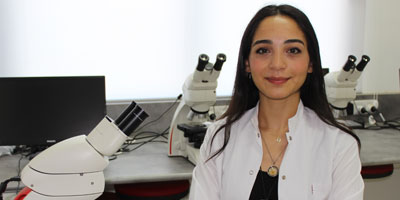EUL Academician Merdan explained the ways of protection from infectious diseases
European University of Lefke (EUL) Faculty of Health Sciences Faculty Member Medical Microbiologist Asst. Prof. Dr. Yağmur Ekenoğlu Merdan gave information about ways of protection from infectious diseases.
“Infectious diseases are diseases that can be passed from person to person, from animal to person or from a source to humans. Infectious diseases are diseases caused by microorganisms such as bacteria, viruses and parasites. Not all infectious diseases are contagious. Infectious diseases can sometimes have a mild course, and they can cause very serious infections and even death. The most important feature of infectious diseases is that they can spread to a large number of people and even cause epidemics because they are contagious. ”He said that it is possible to take the necessary precautions to prevent spread and epidemics and to protect from most infectious diseases by vaccination.
Infectious diseases can be transmitted to humans in a variety of ways.
Stating that infectious diseases can be transmitted to humans in various ways, Merdan stated that contamination can be seen from the respiratory tract, blood tract, sexual tract, foods, animals or the carrier creatures we call vectors.
“Respiratory transmitted diseases can be transmitted by direct contact as well as by airway and droplets. Particles containing airborne microorganisms remain suspended in the air for a long time and can spread over large areas by air currents. The most important of the airborne diseases is tuberculosis, Merdan said. She stated that in diseases transmitted by droplets, infected secretions emanating from the patient by talking, laughing, sneezing and coughing can spread 1-2 meters in the air and settle in the mouth, nose and eye tissues of the person nearby and the disease can be transmitted. “The most important examples of transmission in this way are flu and Covid-19. The most important factors in preventing all respiratory diseases are keeping distance between us and the sick people, providing hand hygiene, not being in closed and crowded environments. She emphasized that it is very important to cover our coughs and sneezes with a disposable handkerchief or elbow, ventilate the environment frequently and pay attention to hand hygiene.
Stating that many diseases that can be transmitted through blood can also be transmitted sexually, Merdan said, “HIV, Hepatitis B and Hepatitis C are the most important examples. To avoid these diseases; “Acupuncture, tattoo needles, manicure sets, razor blades must be disposable or personalized,” she said.
The most important condition in preventing foodborne infections is hand and general kitchen hygiene.
Stating that the most important condition in preventing food-borne infections is hand and general kitchen hygiene, Merdan said, “Apart from that, in order to consume safe food, it is necessary to keep the food at the right temperature, to cook enough, to wash or clean it enough, not to contact cooked foods with raw foods.
“Zoonoses are diseases transmitted from vertebrate animals to humans. The most important examples of zoonoses are Brucellosis, Salmonellosis and Q fever. Especially Brucellosis is an important public health problem in our region and it is transmitted directly from the fluids of animals such as sheep, goats, cattle, and milk and dairy products. “The most important way of protection is to use pasteurized milk and dairy products to prevent contamination.”
Merdan continued her explanation as follows; “In vector-borne diseases, microorganisms are transmitted by an intermediate carrier (vector) such as fleas, ticks or mosquitoes that transfer them to a living organism. It is mostly seen in tropical regions. Malaria is one of the vector-borne diseases transmitted by mosquitoes and Crimean-Congo Hemorrhagic Fever. The most important factor in preventing these diseases is to control the pest in a way that does not harm the nature. In addition, those who go to places where creatures such as flies, ticks and fleas are abundant should prefer to wear light colored clothes, wear clothes that cover the body, wear trousers with socks, and the body should be checked especially in terms of ticks, lice and fleas on return ”.
Vaccine is our most important weapon in combating infectious diseases and epidemics.
Finally, Merdan said, “The most important way to prevent infectious diseases is to be protected and to prevent the spread. The foremost method for this is to provide hand hygiene, to comply with general personal hygiene rules, to stay away from sick people or to approach the patient with protective measures. One of the most important ways of preventing infectious diseases is vaccination. With vaccination, not only individuals who are vaccinated but also all individuals in the society can be protected by ensuring community immunity. It should not be forgotten that our most important weapon in combating infectious diseases and epidemics is vaccination. Today, many infectious diseases are very rare with vaccines. With the success of vaccination programs, many diseases have been reduced or eliminated invisibly, and they will be.

